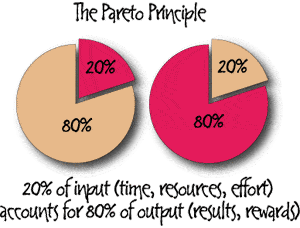I’m sure everybody has probably heard of the 80/20 rule. If you have or if you haven’t you need to read on – it could potentially change your life. It is fundamental to every person whether a business person or not!
Now don’t be put off if you’re not a big fan of numbers. The 80/20 rule, although based on mathematical foundations, is more of a concept. But just in case you want the history here goes…
As quoted by About.com:
In 1906, Italian economist Vilfredo Pareto created a mathematical formula to describe the unequal distribution of wealth in his country, observing that twenty percent of the people owned eighty percent of the wealth. In the late 1940s, Dr. Joseph M. Juran inaccurately attributed the 80/20 Rule to Pareto, calling it Pareto’s Principle.
Dr. Joseph Juran, working in the US in the 1930s and 40s recognized a universal principle he called the “vital few and trivial many” and reduced it to writing.
As a result, Dr. Juran’s observation of the “vital few and trivial many”, the principle that 20 percent of something always are responsible for 80 percent of the results, became known as Pareto’s Principle or the 80/20 Rule.
What exactly does it mean?
Taken literally it means that 80 percent of your outcomes come from 20 percent of your inputs. As Pareto demonstrated mathematically this ‘rule’ works out to an 80/20 ratio. Interestingly his original thoughts were sparked by his garden peas as he observed 20% of the pea pods in his garden contained 80% of the peas! In reality, the ratio is probably a lot higher – even as high as 95/5.
The numbers don’t really matter. What does matter are that in your life there are certain activities that you do (your 20 percent) that are responsible for the majority (your 80 percent) of your happiness and outputs.
In business you can apply this as 20 percent of your activities produce 80 percent of your financial rewards (your income). But the rule can be applied equally to your entire life as well as your working life. If you concentrate on the whole life you will get results in the business part as your overall happiness and well-being have a direct bearing on your working life, in my opinion.
Some 80/20 real-life examples
You can look at various economic conditions to find examples of the 80/20 rule but the rule is best demonstrated by looking at your own habits. It is quite likely that you spend the majority of your money on a few high price items (think rent, car loan, mortgage). Also, consider how many people you know and then consider how many people you actually hang out with on a regular basis. This is the 80/20 rule in action.
How do I apply the 80/20 rule?
Without making a conscious effort I apply the 80/20 rule in my daily life all the time. I love my work as a website designer and the few hours when I am designing a new theme are my most creative and seem effortless. They also are the hours that are my main income-producing hours. I also love to write and the hours spent creating a blog post also seem to fly by. Yet these blog posts create business opportunities and generate income for me as well as letting me express myself.
I also acknowledge that I can spend a lot of time on activities that have no benefit to me, for example, checking Facebook, Twitter and all the other Social distractions that are out there. This time isn’t well spent – that’s not to say I can’t do it in small doses, but it gains me nothing and is not productive. I’m consistently working on trying to reduce time wastage and concentrate on being more productive. I find my motivation is considerably less when faced with a task I don’t particularly enjoy such as bookkeeping.
How can you apply the 80/20 rule to your business?
To have a successful and by that, I mean profit-making business it is crucial to identify the actions or products that generate the most income (your 20 percent) and get rid of the rest (the 80 percent). Evaluate what is working, which actions are bringing in the most results. Concentrate on the tasks that work the hardest for you. Let go of spending extra time on the things that are not working for you. It may mean you need to consider outsourcing some tasks to other people. How many people love to blog but struggle for hours trying to set up their blogs? Use your core skills to work on your income-producing activity and outsource the technical blog issues to Build A Blog.
Take a look at your clients, concentrate your efforts on keeping your good clients happy and up-selling to them and improving their service and drop the bad clients.
How can you apply the 80/20 rule to your lifestyle?
This one is easy – focus on the things that give you the best outcomes. It’s the same in your ‘life’ as it is in your business life – you’d expect that as they are, after all, the same life however you choose to differentiate it. Spend the majority of your time doing what gives you the most pleasure. Read Golf Balls & Beer for a good example of what I mean.
So what? How will it all benefit me?
In summary, by applying the 80/20 rule to your working life you will find that you either have to work fewer hours to get the same results, meaning you will have more free time to do the things that you love or you will have more time available to grow your business (and income) by focusing on the tasks that really work. Either way, it’s a win-win situation.













